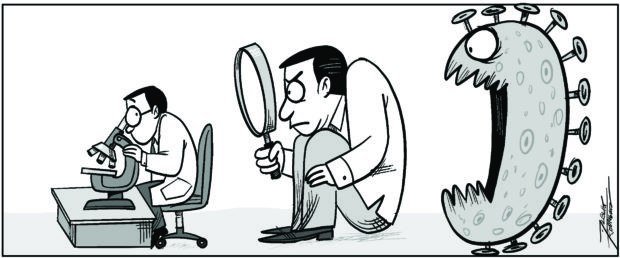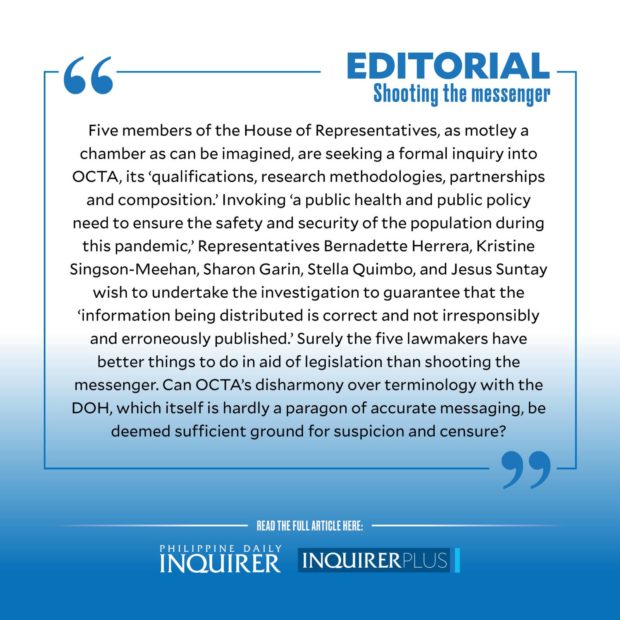Shooting the messenger
Not surprisingly, OCTA Research having earlier issued warnings, the Philippines is back to “high-risk” classification for COVID-19, and the Department of Health (DOH) has announced a 59-percent increase in infections in all age groups in the past two weeks. It’s a discouraging point to ponder as the number of cases of the virus’ highly transmissible Delta variant increases: 450 cases as of the first Monday of the Aug. 6-20 enhanced community quarantine, and detected in 13 of 17 regions nationwide.
Local government units are striving mightily to conduct safe and efficient inoculation programs for their respective constituents in the face of a spotty supply of vaccines and, strangely and alarmingly, throngs of people suddenly materializing at jab centers in various cities in Metro Manila, prodded by word of mouth and online “tips” on where to get vaccinated. The Palace denies it, but the swarming appears to be driven by President Duterte’s earlier threats against the unvaccinated—“ayaw magpabakuna” was his term, even if it’s plain to see that it’s not jab resistance but vaccine scarcity that is producing low vaccination figures.
Article continues after this advertisementWith hospitals in the National Capital Region and elsewhere again at full capacity, “surge” seems the operative word despite the DOH’s initial refusal to use it. OCTA employed the phrase “a serious surge” as early as Aug. 1; it went on to say, citing the latest indicators, that community transmission of the Delta variant could already be occurring. Yet the DOH and its advisers hedged, saying OCTA’s projections were, because based on two-week-old data that were “subject to error,” bound to be erroneous.
Now five members of the House of Representatives, as motley a chamber as can be imagined, are seeking a formal inquiry into OCTA, its “qualifications, research methodologies, partnerships, and composition.” Invoking “a public health and public policy need to ensure the safety and security of the population during this pandemic,” Representatives Bernadette Herrera, Kristine Singson-Meehan, Sharon Garin, Stella Quimbo, and Jesus Suntay wish to undertake the investigation to guarantee that the “information being distributed is correct and not irresponsibly and erroneously published.”
Surely the five lawmakers have better things to do in aid of legislation than shooting the messenger. Can OCTA’s disharmony over terminology with the DOH, which itself is hardly a paragon of accurate messaging, be deemed sufficient ground for suspicion and censure? As is now obvious, OCTA has not been crying “wolf!” in seeking a “circuit-breaker” despite the damage another lockdown would further inflict on the economy. The realities on the ground, including the rising number of COVID-afflicted children, show it.
Certain members of the “polling, research, and consultation” firm that, per its website, provides “comprehensive, holistic, accurate, rigorous, and insightful data analysis” to the public and private sectors as well as nongovernment organizations, have responded thoughtfully to the idea of a House probe. The molecular biologist Nicanor Austriaco said that “despite our differences, we must work together as one people to fight our common enemy … the virus that is threatening [our] lives.” The mathematician Guido David, expressing surprise at the House’s resolution, said a discussion of methodologies would be welcome but he couldn’t see the chamber as the proper venue for it. He likened it, quaintly but correctly, to a thesis defense conducted in a wet market.
Imagine the time, energy, and taxpayer money it would entail if the same excess of concern were to be brought to bear, in the run-up to the election campaign, on other issues concerning government messaging. For example, isn’t there a “public policy need” to look into the issuance and subsequent withdrawal of a show-cause order to Manila Mayor Isko Moreno over his purported failure to implement a memo involving the war on drugs in 2018, when he had yet to become hizzoner?
Granted that the public is yet to be fully acquainted with OCTA and its methodologies. But curiously, no one among the five lawmakers thought to examine the credentials of the commissars of the Inter-Agency Task Force for the Management of Emerging Infectious Diseases, who lead the government’s pandemic response and ultimately determine the quality of our very lives. Or even the bona fides of the chiefs of the DOH and the Food and Drug Administration.
Two things may result from such a formal inquiry: It would comfort anxious Filipinos that they’re in capable hands, or — more likely — it would show why the debt watcher Moody’s Investors Service is saying that the pandemic-inflicted “deep scarring” is certain to worsen social inequality in this unhappy archipelago.


















